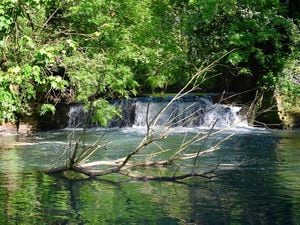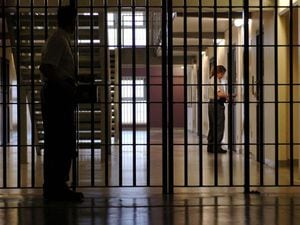Dead horse still in river three weeks later as organisations say clearing it 'not their responsibility'
A dead horse remains in a river three weeks after it was discovered as organisations continue to claim it's not their responsibility to remove it.

The horse has been stuck in the Wordsley Waterfall on the River Stour since March 11, but local councils, emergency services and agencies have all refused to take responsibility to recovering the animal.
South Staffordshire Council said it did not have a legal or statutory duty to remove it, while Staffordshire Fire and Rescue said it did not have the resources available to recover the animal.
While the waterfall has a Dudley postcode, DY8 5HS, the area falls under the jurisdiction of South Staffordshire District Council.
A spokesman for South Staffordshire Council said: “Despite the carcass being within the boundary of South Staffordshire, the council does not have a legal or statutory duty to remove it from the watercourse, and as such we do not have the necessary resources or expertise to handle the matter safely ourselves.
“We do of course appreciate the sight of the carcass is unpleasant and ongoing work is being undertaken by officers to find a solution for its removal.
“This is, however, proving extremely difficult.
"Accessing and removing the carcass is very challenging due to a lack of vehicle access making getting equipment on site difficult.
"The carcass is also lodged in overhanging trees in very close proximity to fast flowing water.
“The council has been advised that the carcass does not present a flooding or pollution risk, therefore, the potential safety risks for anyone tasked with the removal of the carcass must be considered accordingly.”
A spokesman for Staffordshire Fire and Rescue said: "Following a report from a member of the public, a Station Manager visited the location on Tuesday to assess the situation and established that it would take a considerable number of resources to recover the carcass.
"This would include an animal rescue unit, a water rescue unit, a rope rescue unit and up to two fire engines. It would also require specialists including a tactical advisor and water incident manager.
"These vehicles and crews would therefore not be available to attend emergencies if they were dealing with this recovery, which could take a considerable amount of time due to the complexity of the operation.
"We understand that this is an emotive matter and we continue to offer support and advice to partner agencies, however it is not a statutory duty of the fire and rescue service to recover deceased animals."
A spokesman for the RSPCA said: "The RSPCA is saddened to hear that the body of a horse has been found at Wordsley Waterfall.
“We understand in this case that the horse is in a difficult location so the removal would be challenging, however we hope a resolution can soon be found.
"Hopefully if an owner comes forward they will be able to make arrangements to remove the body safely.
“Sadly it is something we see on a fairly regular basis as the cost of disposing of a large animal’s body properly can be expensive - and this is even without the current cost of living struggle.
“Only if the circumstances surrounding an animal death are suspicious would we ask people to call the RSPCA so we can investigate any animal welfare issues further, however it seems this is not the case here.
“As a charity we have to prioritise our resources so our emergency responders are able to attend calls of animals in urgent need.”
A spokesman for the Environment Agency said: “Sadly we have recently been made aware of reports of a deceased horse at the Wordsley Waterfall in the River Stour.
“While we share the local community’s distress, the Environment Agency is unable to remove dead animals or birds from private land as the responsibility lies with the owner of either the land or deceased animal.
“We are able to respond to such incidents only if the watercourse becomes blocked and poses a risk of flooding.
"We encourage the horse’s owner to come forward and remove it.”





